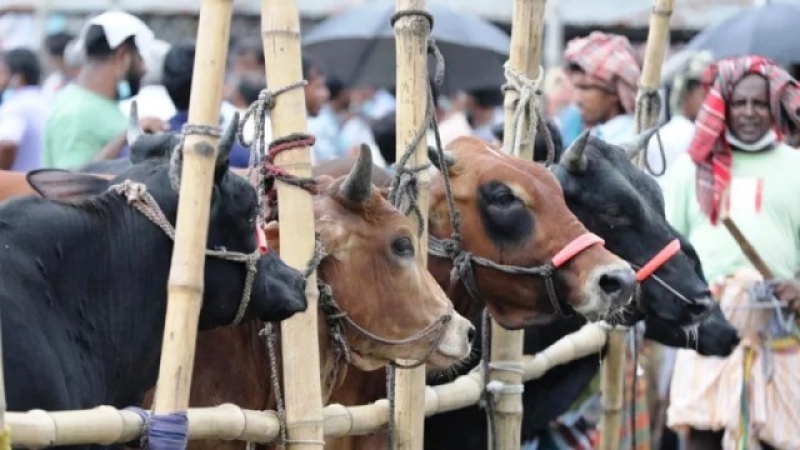- Puppet show enchants Children as Boi Mela comes alive on day 2 |
- DSCC Admin Salam’s drive to make South Dhaka a ‘clean city’ |
- 274 Taliban Dead, 55 Pakistan Troops Killed |
- Now 'open war' with Afghanistan after latest strikes |
- Dhaka's air quality fourth worst in world on Friday morning |
Giant bulls ‘Bir Bahadur’, Samrat attractions in Lalmonirhat

Sacrificial animals at a market in Lalmonirhat. UNB
Lalmonirhat, May 27 – As Eid-ul-Azha approaches, a cattle farm in Kaliganj upazila of Lalmonirhat has become a center of attraction for locals thanks to two giant bulls—‘Bir Bahadur’ and ‘Samrat’—weighing around 20 maunds (approximately 800 kg) each and priced at Tk 6-7 lakh.
The bulls, raised at Muttakin Mubin Fattening and Dairy Farm in Cholabala union, are the pride of farm owner Alamgir Hossain Alam, a resident of Nithok village.
Of the two, ‘Bir Bahadur’ stands out with his striking black coat, towering six feet in height and stretching nine feet in length.
His impressive physique and calm temperament have made him a favorite among visitors, particularly schoolchildren and villagers who frequently visit the farm to catch a glimpse of the animals.
Claiming ‘Bir Bahadur’ to be the largest bull in the upazila, Alamgir said, “I’ve been rearing him naturally for the past three years with local feed and no chemical enhancers. It often takes three to four people to manage him due to his strength and size.”
The bull is fed a nutritious diet including natural grass, oilcake, bran, and other organic items, and bathed three times a day with special care taken to ensure his health and hygiene, he said.
During a recent visit to the farm, the UNB correspondent found that cattle farmers in the farm are now busy preparing for Eid, feeding their livestock with a combination of straw, green grass, oilcake, and grain.
Like previous years, many are eyeing buyers from both local and distant markets.
“This year, despite the high cost of cattle feed, I’m hopeful about good returns,” Alamgir added.
“I’ve prepared 20 bulls for sale, including these two premium ones—Bir Bahadur and Samrat—expected to fetch Tk 6-7 lakh each,” he said.
Kaliganj Upazila Livestock Officer Dr Md Ferdousur Rahman said monitoring teams are active in the cattle markets and farms to ensure that no animals treated with harmful chemicals or steroids are sold.
“We’ll have veterinary medical teams at every cattle market during Eid,” he said.
A total of 35,850 sacrificial animals—including cows, buffaloes, goats, and sheep—are ready in the upazila, while the estimated demand is around 28,280.
“We have a surplus this year. Alongside physical markets, initiatives have been taken to facilitate online sales of cattle,” he added. - UNB

